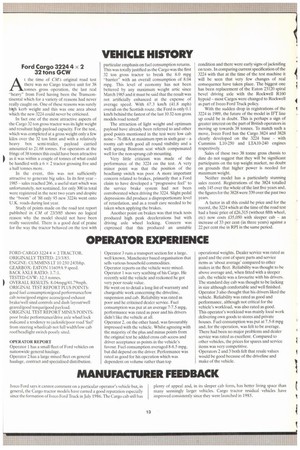VEHICLE HISTORY
Page 173

If you've noticed an error in this article please click here to report it so we can fix it.
Ford Cargo 3224 4 x 2 32 tons GCW At the time of CM's original road test there was no Cargo tractive unit for 38 tonnes gross operation, the last real -heavyfrom Ford having been the Transconfinental which for a variety of reasons had never really caught on. One of these reasons was surely high kerb weight and this was one area about which the new 3224 could never he criticised.
In fact one of the most attractive aspects of the Cargo 32 ton gross tractor was its light weight and resultant high payload capacity. For the test. which was completed at a gross weight only a few kilos over the 32 ton limit and with a relatively heavy box semi-trailer, payload carried amounted to 21.68 tonnes. For operators at the fringe of 38 tonnes this could have been attractive as it was within a couple of tonnes of what could be handled with a 6 x 2 tractor grossing five and a half tonnes more.
In the event, this was not sufficiently attractive to generate big sales. In its first year 1985sales reached 266, a useful start which was unfortunately, not sustained, for only 300 in total were registered in the next two years and despite the "boomof '88 only 93 new 3224s went onto U.K. roads during last year.
Study of points made on the road test report published in CM of 23/3/85 shows no logical reason why the model should not have been really successful. There is a good deal of praise for the way the tractor behaved on the test with
particular emphasis on fuel consumption returns. This was totally justified as the Cargo was the first 32 ton gross tractor to break the 8.0 mpg "bather" with an overall consumption of 8.04 mpg. This level of economy has not been bettered by any maximum weight artic since March 1985 and it must be said that the result was not artificially enhanced at the expense of average speed. With 67.3 km/h (41.8 mph) overall on the Scottish route, the Ford is only 0.1 km/h behind the fastest of the last 1032-ton gross models road tested!
The attraction of light weight and optimum payload have already been referred to and other good points mentioned in the test were low cab noise -76 dBA at maximum rpm in sixth gear a roomy cab with good all round visibility and a well sprung Bostrom seat which compensated well for the non-sprung cab mounting.
Very little criticism was made of the performance of the 3224 on the test. A very minor point was that the position of the headlamp switch was poor. A more important concern related to brakes, primarily that a Ford claim to have developed a "progressive feel" to the service brake system had not been corroborated when driving the 3224. Slight pedal depressions did produce a disproportionate level of retardation. and as a result care needed to be taken when applying the brakes.
Another point on brakes was that track tests produced high peak decelerations but with driving axle wheel locking. Concern was expressed that this produced an unstable condition and there were early signs of jaclunfing on tests. In comparing current specification of the 3224 with that at the tune of the test machine it will be seen that very few changes of real consequence have taken place. The biggest one has been replacement of the Eaton 23120 spiral bevel driving axle with the Rockwell R160 hypoid most Cargos were changed to Rockwell as part of Iveco Ford Truck policy.
With the sudden drop in registrations of the 3224 in 1989, the future of the model in IFT line up could be in doubt. This is perhaps a sign of greater interest on the part of British operators in moving up towards 38 tonnes. To match such a move. Iveco Ford has the Cargo 3824 and 3828 clearly developed on the 3224 base with Cummins L10-250 and LTA10-240 engines respectively.
Sales of these two 38 tonne gross chassis to date do not suggest that they will be significant participants on the top weight market, no doubt on grounds that higher power is needed for maximum weight.
Neither model has a particularly stunning sales record. Registrations of the 3824 totalled only 145 over the whole of the last five years and, the figures for the 3828 were 339 over the past two years.
A factor in all this could be price and for the record, the 3224 which at the time of the road test had a basic price of £26,315 (without fifth wheel, etc) now costs £35,050 with sleeper cab an increase of 33 per cent (in three years) against a 22 per cent rise in RPI in the same period.
































































































































































































